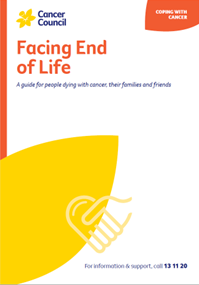- Home
- About Cancer
- Advanced cancer
- Facing end of life
- Emotional and spiritual needs
Emotional and spiritual needs
As you approach the end of life, you may struggle with talking about death and dying, and finding hope and meaning.
Learn more about:
- Talking about dying
- The effect on people close to you
- If you live alone
- How to tell children
- Coping with change and loss
- Spirituality at the end of life

We offer ideas for starting conversations, and managing emotional and spiritual needs.
Talking about dying
Most people avoid talking about death or dying – and when they do, they may use different words, such as “passed away”, “departed”, “gone” or “slipped away”.
It’s up to you when, or even if, you tell those around you that you’re dying. Take what time you need, but delaying the conversation usually doesn’t make it any easier. It may help to be in control of what information is given out and when, rather than people hearing the news from others or guessing what is going on.
You might find it easier if you practise what you will say. Sometimes family members may seem more distressed than the person with cancer, which can be hard to cope with alongside your own emotions.
Explain to family and friends how much or how little you want to talk about dying, and any other practical or legal issues you want to discuss.
Why it can help to talk
There may be days when you feel like talking about approaching the end of life, and days when you don’t. This may even change from minute to minute.
In general, it can help to discuss your fears and concerns about death with trusted family and friends.
When you share how you think and feel with people you trust, it can help support all of you through the sadness, anxiety and uncertainty.
Some people dying with cancer have said that the process can feel isolating and lonely, even with a stream of visitors. This is particularly true if family and friends avoid talking about what is happening. If you are comfortable with people acknowledging that you are dying with cancer, let them know.
When you don’t want to talk
You may find that you don’t want to talk about dying, or that you want to discuss it with some people but not others.
You may be the type of person who would prefer to focus on making the most of the time you have left, rather than talking about death.
In some cultures, people think it’s disrespectful to talk about dying, or they may feel that talking about death makes it happen sooner.
Everyone handles dying in their own way. If you don’t want to talk about facing the end of life, your wishes should be respected.
→ READ MORE: The effect on people close to you
Podcast: Living with Dying
Listen to more episodes of our podcast for people affected by cancer
More resources
Prof Jane Phillips, Head, School of Nursing and Professor, Centre for Healthcare Transformation, Queensland University of Technology and Emerita Professor Palliative Nursing, University of Technology Sydney, NSW; Prof Meera Agar, Palliative Care Physician, Professor of Palliative Medicine, University of Technology Sydney, IMPACCT, Sydney, NSW; Sandra Anderson, Consumer; A/Prof Megan Best, The University of Notre Dame Australia and The University of Sydney, NSW; Prof Lauren Breen, Psychologist and Discipline Lead, Psychology, Curtin University, WA; David Dawes, Manager, Spiritual Care Department, Peter MacCallum Cancer Centre, VIC; Rob Ferguson, Consumer; Gabrielle Gawne-Kelnar, Counsellor, Psychotherapist and Social Worker, One Life Counselling & Psychotherapy, NSW; Justine Hatton, Senior Social Worker, Southern Adelaide Palliative Services, Flinders Medical Centre, SA; Caitlin MacDonagh, Clinical Nurse Consultant, Palliative Care, Royal North Shore Hospital, Northern Sydney Local Health District, NSW; McCabe Centre for Law and Cancer; Palliative Care Australia; Belinda Reinhold, Acting Lead Palliative Care, Cancer Council QLD; Xanthe Sansome, National Program Director, Advance Care Planning Australia; Kirsty Trebilcock, 13 11 20 Consultant, Cancer Council SA.
View the Cancer Council NSW editorial policy.
View all publications or call 13 11 20 for free printed copies.

